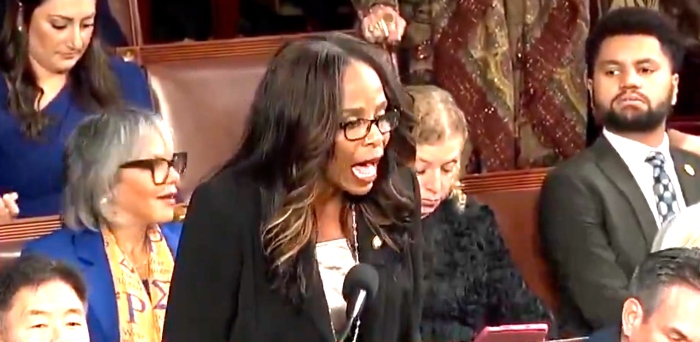The 119th Congress opened with high drama as Democrat Delegate Stacey Plaskett from the U.S. Virgin Islands disrupted proceedings during the Speaker election. Plaskett, who lacks voting power in Congress, took the floor in a pointed outburst that surprised lawmakers and prompted House Parliamentarian Jason Smith to explain fundamental procedural rules.
Plaskett’s protest focused on the non-voting status of delegates from U.S. territories, including the Virgin Islands, Puerto Rico, and Guam, as well as the District of Columbia. Collectively, these jurisdictions represent nearly four million residents without voting representation in the House. Her passionate remarks soon escalated into a tense exchange with House GOP leadership, mostly because, as a delegate serving since 2015, she’s well aware that she and other delegates have no voting powers.
“Mr. Speaker, I ask why the names of the delegates and resident commissioners were not called,” Plaskett demanded, interrupting the clerk’s reading of the roll. Her frustration led her to insist that Smith publicly state the rules prohibiting territorial delegates from voting in the Speaker election, but it also led to Republican calls for “order!” from the other side of the aisle.
Smith explained the voting procedure clearly, citing Section 36, which specifies that only representatives-elect from states are eligible to vote in the election of a Speaker. “Representatives-elect are the only individuals qualified to vote in the election of a speaker, as provided in Section 36 of the House Rules and Manual,” the clerk said. Despite the explanation, Plaskett persisted, “This body, and this nation, has a territories and a colonies problem. What was supposed to be temporary has now effectively become permanent. We must do something about this problem.” While she criticized the U.S. territories’ lack of voting rights, she did not explain why these issues have gone unresolved during decades of Democrat-led administrations. And her continued complaining eventually led to her mic being cut off.
WATCH:
U.S. Virgin Islands delegate Stacy Plaskett, a New York-born Democrat, whines on the House floor that delegates don’t get to vote for House Speaker.
She knows this. She’s been the VI delegate since 2015. She got shut down with a mic cut.
Democrats gonna Democrat. pic.twitter.com/4QlR4fwBu5
— USA Features Media (@UsaFeatures) January 5, 2025
The United States has five primary inhabited territories—Puerto Rico, Guam, the U.S. Virgin Islands, American Samoa, and the Northern Mariana Islands—along with the District of Columbia, which is a federal district, not a state. While residents of these territories are U.S. citizens (except for American Samoa, where they are U.S. nationals), they do not have full voting representation in Congress. Each territory and the District of Columbia elect a non-voting delegate or resident commissioner to the House of Representatives. These representatives can debate legislation, introduce bills, and serve on committees, but they are not permitted to vote on the final passage of legislation or participate in crucial votes, such as electing the Speaker of the House.



